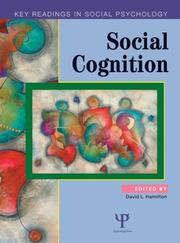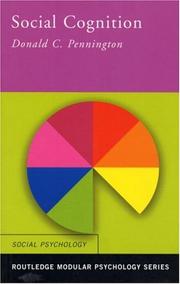| Listing 1 - 10 of 106 | << page >> |
Sort by
|
Book
ISBN: 2706129875 9782706129872 9782706126963 Year: 2017 Publisher: Fontaine Presses Universitaires de Grenoble
Abstract | Keywords | Export | Availability | Bookmark
 Loading...
Loading...Choose an application
- Reference Manager
- EndNote
- RefWorks (Direct export to RefWorks)
La première synthèse en France sur les concepts clés de la cognition sociale. Quels sont les processus qui façonnent notre perception de l'environnement, des autres et de nous-mêmes ? Comment ces processus déterminent-ils nos comportements au quotidien (nos gestes citoyens, d'aide, de discrimination, etc.) ? Après un chapitre d'introduction au domaine de la cognition sociale, les auteurs en exposent les concepts clés. Ils présentent les processus par lesquels les individus construisent la perception de leur environnement, d'autrui et d'eux-mêmes, le rôle de ces constructions dans le comportement quotidien, et leur rapport avec les émotions. Un sujet transversal qui intéresse de nombreuses disciplines et champs professionnels : enseignants et étudiants en psychologie et en neurosciences mais aussi professionnels du marketing, des neurosciences, des sciences de l'éducation et, de manière générale, toute personne intéressée par le fonctionnement du comportement humain.
Social perception. --- Cognition, Social --- Interpersonal perception --- Social cognition --- Interpersonal relations --- Perception --- Social cognitive theory
Book
ISBN: 0128156341 0128153156 9780128156346 9780128153154 Year: 2019 Publisher: London, England : Academic Press,
Abstract | Keywords | Export | Availability | Bookmark
 Loading...
Loading...Choose an application
- Reference Manager
- EndNote
- RefWorks (Direct export to RefWorks)
Social perception. --- Cognition, Social --- Interpersonal perception --- Social cognition --- Interpersonal relations --- Perception --- Social cognitive theory
Multi
ISBN: 9781783741854 9781783741861 1783741856 1783741864 178374183X 9781783741830 9781783741830 178374183X 9781783741847 1783741848 1783741864 9781783741878 1783741872 2821881711 Year: 2016 Publisher: Open Book Publishers
Abstract | Keywords | Export | Availability | Bookmark
 Loading...
Loading...Choose an application
- Reference Manager
- EndNote
- RefWorks (Direct export to RefWorks)
Language is a human universal reflecting our deeply social nature. Among its essential functions, language enables us to quickly and efficiently share information. We tell each other that many things are true—that is, we routinely make assertions. Information shared this way plays a critical role in the decisions and plans we make. In Knowledge and the Norm of Assertion, a distinguished philosopher and cognitive scientist investigates the rules or norms that structure our social practice of assertion. Combining evidence from philosophy, psychology, and biology, John Turri shows that knowledge is the central norm of assertion and explains why knowledge plays this role. Concise, comprehensive, non-technical, and thoroughly accessible, this volume quickly brings readers to the cutting edge of a major research program at the intersection of philosophy and science. It presupposes no philosophical or scientific training. It will be of interest to philosophers and scientists, is suitable for use in graduate and undergraduate courses, and will appeal to general readers interested in human nature, social cognition, and communication.
Assertion (Linguistics) --- Knowledge, Theory of. --- social cognition --- language --- cognitive sciences --- communication --- philosophy

ISBN: 0198246072 Year: 1980 Publisher: Oxford Clarendon
Abstract | Keywords | Export | Availability | Bookmark
 Loading...
Loading...Choose an application
- Reference Manager
- EndNote
- RefWorks (Direct export to RefWorks)
Cognitive psychology --- Social perception --- Perception sociale --- Cognition, Social --- Interpersonal perception --- Social cognition --- Interpersonal relations --- Perception --- Social cognitive theory --- Social perception.

ISBN: 086377590X 0863775918 9780863775918 Year: 2005 Publisher: New York Psychology press
Abstract | Keywords | Export | Availability | Bookmark
 Loading...
Loading...Choose an application
- Reference Manager
- EndNote
- RefWorks (Direct export to RefWorks)
Cognition --- Social perception. --- Perception sociale --- Social perception --- Cognition, Social --- Interpersonal perception --- Social cognition --- Interpersonal relations --- Perception --- Social cognitive theory
Periodical
ISSN: 23224312 23223782 Year: 2012 Publisher: Mashhad : Dānishgāh-i Payām-i Nūr,
Abstract | Keywords | Export | Availability | Bookmark
 Loading...
Loading...Choose an application
- Reference Manager
- EndNote
- RefWorks (Direct export to RefWorks)
psychology --- Social perception --- Cognition --- Cognition. --- Social perception. --- Cognition, Social --- Interpersonal perception --- Social cognition --- Interpersonal relations --- Perception --- Social cognitive theory --- Psychology
Book
ISBN: 1282716425 9786612716423 3110224895 9783110224894 9783110224887 3110224887 Year: 2010 Publisher: Berlin Boston
Abstract | Keywords | Export | Availability | Bookmark
 Loading...
Loading...Choose an application
- Reference Manager
- EndNote
- RefWorks (Direct export to RefWorks)
Grounded primarily in the ethnography of communication and aligned with the multidisciplinarity of discourse analysis, the book examines the use of proverbs in the daily life of a social network of Mexican-origin transnational families in Chicago and Michoacán, Mexico. Various and detailed analyses of actual proverb use reveal that proverbs in this particular population function as a highly contextualized communicative strategy that serves four discrete social functions: to argue, to advise, to establish rapport, and to entertain. Proposing that the social and cognitive aspects of language use must be combined for a complete understanding of how such genres of language are actually used by regular people in daily life, the author shows how ordinary people use sophisticated cognitive processes to interpret the socially-relevant meanings of proverbs in everyday conversation. The book provides an unusual mix of contextualized discourse analysis that is ethnographic, linguistic, and cognitive, yielding much needed insight into a segment of the Mexican-origin population of the Midwestern U.S., a population whose increasing importance and size is often mentioned, but about which precious few linguistic studies have been conducted. The volume not only helps to fill this void but it is also one of the few studies that focuses on the impact of transnationalism on linguistic practices, regardless of cultural group. Departing from the conventional approach of ignoring the role of everyday-language use in order to focus exclusively on culture, economics, or migrant patterns, the book makes linguistic practice the central issue, and thus affirms that it is language that weaves together the two distant sites of transnational communities, providing a fertile area for understanding the perspectives of the transmigrants themselves.
Proverbs --- Discourse analysis. --- Discourse grammar --- Text grammar --- Semantics --- Semiotics --- Paremiology --- Paroemiology --- History and criticism. --- Discourse Analysis. --- Rhetorics. --- Social Cognition. --- Sociolinguistics.
Book
ISBN: 0471921092 Year: 1968 Publisher: London Wiley
Abstract | Keywords | Export | Availability | Bookmark
 Loading...
Loading...Choose an application
- Reference Manager
- EndNote
- RefWorks (Direct export to RefWorks)
Social psychology --- Social perception --- Perception sociale --- 159.93 --- Cognition, Social --- Interpersonal perception --- Social cognition --- Interpersonal relations --- Perception --- Social cognitive theory --- Zintuiglijke waarnemingen --- Social perception. --- 159.93 Zintuiglijke waarnemingen

ISBN: 2706106530 9782706106538 Year: 1996 Volume: 11 Publisher: Grenoble : Presses universitaires de Grenoble,
Abstract | Keywords | Export | Availability | Bookmark
 Loading...
Loading...Choose an application
- Reference Manager
- EndNote
- RefWorks (Direct export to RefWorks)
Cognition [Social ] --- Cognition sociale --- Interpersonal perception --- Perceptie [Sociale ] --- Perception interpersonnelle --- Perception sociale --- Social cognition --- Social perception --- Sociale perceptie --- Sociale waarneming --- Waarneming [Sociale ]

ISBN: 0415217040 0415217059 Year: 2000 Publisher: London Routledge
Abstract | Keywords | Export | Availability | Bookmark
 Loading...
Loading...Choose an application
- Reference Manager
- EndNote
- RefWorks (Direct export to RefWorks)
Social perception. --- Perception sociale --- #PBIB:2004.4 --- Social perception --- Cognition, Social --- Interpersonal perception --- Social cognition --- Interpersonal relations --- Perception --- Social cognitive theory
| Listing 1 - 10 of 106 | << page >> |
Sort by
|

 Search
Search Feedback
Feedback About UniCat
About UniCat  Help
Help News
News